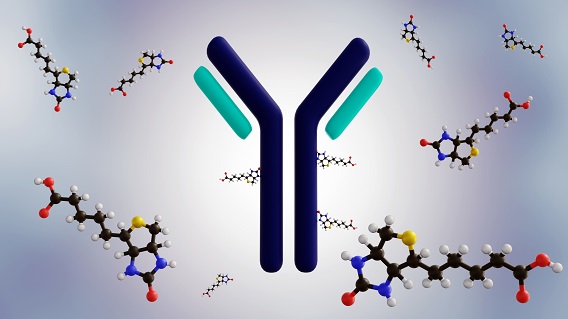Pioneering Mesothelioma & Lung Cancer Therapy via ADCs
Awareness & ResearchWritten by Travis Rodgers | Edited by Amy Edel

Thoracic surgeon Dr. Jacques Fontaine calls antibody-drug conjugates the new frontier in lung cancer and mesothelioma treatment. We spoke with Dr. Fontaine, the director of the Mesothelioma Research and Treatment Center at Moffitt Cancer Center, about this emerging therapy during our exclusive video interview with him.
This targeted therapy combines an antibody with a powerful chemotherapy drug. An antibody is a blood protein from the immune system that recognizes and neutralizes threats like bacteria, viruses and cancer cells. Antibody-drug conjugates use this targeted approach to deliver chemo directly to tumors, limiting damage to healthy tissue.
ADC focuses on the protein mesothelin. This protein is found in high amounts on the surface of most, especially epithelioid, mesothelioma cells. It’s also highly expressed in many lung cancer cells, particularly non-small cell lung cancer. But it’s rare on normal cells, making mesothelin a promising target for ADC treatments.
“Once we have identified a specific type of protein on the cancer, a protein that’s almost exclusively found on that cancer cell and nowhere else in that patient’s body, then we can target that protein,” Dr. Fontaine explains. “How do we target that protein? Well, proteins are also called antigens, and antigens bind to antibodies.”
He adds, “An antibody and an antigen are like a key and a lock. Only the antibody will come and lock onto that antigen. So now, on that antibody, you can place chemotherapy bound to it. And that’s called an Antibody-Drug Conjugate.”
ADCs Target Lung Cancer and Mesothelioma More Precisely
Attaching ADCs to chemo for mesothelioma and lung cancer and delivering it directly to specific cancer cells allows the drug to only attack cancer, not the whole body. Dr. Fontaine emphasizes, “With the advent of innovative cancer treatments such as antibody drug conjugates, we are now changing lung cancer treatment to make it more specific to the tumor, where we reduce side effects.”
He clarifies, “Chemotherapy used to go through the whole body and give side effects throughout the whole body. But now if we’re able to send the cancer treatment where it attaches only to the cancer cell, or predominantly only to the cancer cell, then we decrease the likelihood of side effects. And we decrease the intensity of the side effect.”
Building on the success of combining ADCs with chemotherapy, researchers are now investigating ways to pair these targeted antibodies with radiation therapy. This approach could enable doctors to treat mesothelioma and lung cancer more precisely using traditional therapies in new ways that enhance treatment accuracy.
“We can link that same antibody to a radioactive molecule, so it’s basically a miniature smart nuclear bomb,” Dr. Fontaine conveys. “It will be able to deliver the payload or that nuclear substance to kill only the cancer cell and nowhere else in the body.”
Dr. Fontaine adds, “That’s the key. The antigen and the antibody interaction allows the payload to go, whether it’s chemotherapy or radioactive molecules, only to that cancer cell.”
ADC Clinical Trials Are Underway for Mesothelioma and Lung Cancer
Several ADCs targeting mesothelin are currently being tested in clinical trials for mesothelioma and lung cancer. A current MesoC2 phase 1 trial aims to evaluate another mesothelin-targeting ADC’s safety. This study also looks at tolerability and early signs of effectiveness in people with advanced cancers, including mesothelioma. Up to 365 participants are expected to take part.
Another ADC is being investigated for mesothelioma. Early results of an anetumab ravtansine trial suggest it may slow tumor growth. But it hasn’t yet met key trial goals. Researchers continue to explore how anetumab ravtansine can be safely combined with other therapies, especially immunotherapies, to improve outcomes.
A combined BMS-986148 phase 1 and phase 2a trial involved patients with advanced solid tumors. Researchers studied it alone and alongside the immunotherapy drug Opdivo. People who received both treatments experienced longer progression-free survival, about 6.5 months, than those treated with Opdivo alone.
More research is needed before this approach moves on to phase 3.
These trials represent ongoing efforts to develop better treatments for mesothelioma and lung cancer. Researchers aim to create therapies that attack cancer cells precisely while reducing harm to healthy tissue and improving patient care.







